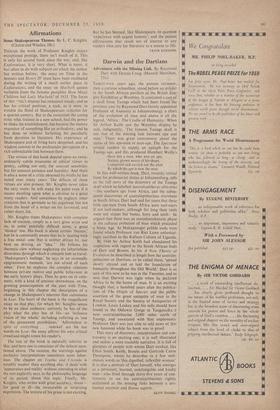Some Shakespearean Themes. By L. C. Knights. (Chatto and Windus,
18s.) THOUGH the work of Professor Knights enjoys exceptional prestige, there isn't much of it. This is only his second book since the war, and, like Explorations, it is very short. What is more, it has often to do with subjects on which the author has written before: the essay on Time in the Sonnets and Henry IV must have been meditated during the writing of a much earlier piece in Explorations, and the essay on Macbeth quotes verbatim from the famous pamphlet How Many Children had Lady Macbeth? of 1933. The focus of this Pritic's interest has remained steady, and so has his critical position, a rock, as it were, to trouble the flood of Shakespearean criticism for a quarter-century. But in the meantime the young critic who, trained in a new school, had the power to shake the establishment, has become the mature expositor of something like an orthodoxy; and he has done so without forfeiting his peculiarly fresh devotion to literature. His experience of Shakespeare and of living have deepened, and his wisdom consists in the profounder perception of a rich unbreakable link between them.
The virtues of this book depend upon an extra- ordinarily subtle treatment of ethical values in poetry, calling not only for unusual sensibility but for unusual patience and humility. And there is also a sense of a critic obsessed by truths Ile has tested over many years. The defects of these virtues are also present. Mr. Knights never takes the easy route; he will make his point even if it means dwelling upon what is obvious to a great many readers. And sometimes he neglects other criticism that is germane to his argument but not from the hand of a writer on his favoured, and rather short, list.
Mr. Knights treats Shakespeare with complete lack of unction, simply as a very great artist and so, in some painfully difficult sense, a great 'thinker' too. His book is about certain 'themes,' but he is continually aware that he is 'dealing with a free mind—one that is neither driven by, nor bent on driving, an "idea."' He follows his thematic clew without neglecting the labyrinthine diversities through which it compels him to travel. 'Shakespeare's feelings,' he says in an unusually epigrammatic moment, 'are not afraid of each other.' First he explores the complex relations between private motive and public behaviour in the early history plays. Then he goes on to com- ment, with a kind of anxious shrewdness, on the growing preoccupation of the poet with Time, beginning in this chapter the description of a change in Shakespeare's interests that culminates in Lear. The heart of the book is the magnificent essay on that play, for which Mr. Knights seems to be an ideal audience; certainly he has of the play what the play has of life—an 'inclusive vision of the whole,' including suffering as 'one of the permanent possibilities.' Allirmiation in spite of everything . . . renewal' are his last words on Lear; the essay affirms his own critical creed and might renew his reader's.
The rest of the book is naturally inferior to this, and here one is conscious of the defects men- tioned above. The caution, the warnings against exclusive interpretations sometimes seem labor- ious. The chapter on Troilus and C'ressida is notably weaker than anything else; it deals' with 'appearance and reality' without attending to what the text explicitly says, in the philosophic language of its period, about this topic. Finally, Mr. Knights, who writes with great accuracy, shuns— for good or ill—the memorable or surprising expression. The texture of his prose is not exciting. But he has learned, like Shakespeare, to question 'experience with urgent honesty'; and the patient affirmations that result are of interest to any readers who care for literature as a means to life.
FRANK KERMODE


























 Previous page
Previous page